英语翻译三级笔译实务真题2017年11月及答案解析
全国人事部英语翻译三级考试样题(笔译实务)

全国翻译专业资格(水平)考试英语三级《笔译实务》试卷Section 1: English-Chinese Translation (50 points)Translate the following passage into Chinese.Freed by warming, waters once locked beneath ice are gnawing at coastal settlements around the Arctic Circle.In Bykovsky, a village of 457 residents at the tip of a fin-shaped peninsula on Russia’s northeast coast, the shoreline is collapsing, creeping closer and closer to houses and tanks of heating oil, at a rate of 15 to 18 feet, or 5 to 6 meters, a year. Eventually, homes will be lost as more ice melts each summer, and maybe all of Bykovsky, too.“It is practically all ice —permafrost —and it is thawing.” The 4 million Russian people who live north of the Arctic Circle are feeling the effects of warming in many ways. A changing climate presents new opportunities, but it also threatens their environment, the stability of their homes, and, for those whose traditions rely on the ice-bound wilderness, the preservation of their culture.A push to develop the North, quickened by the melting of the Arctic seas, carries its own rewards and dangers for people in the region. Discovery of vast petroleum fields in the Barents and Kara Seas has raised fears of catastrophic accidents as ships loaded with oil or liquefied gas churn through the fisheries off Scandinavia, headed for the eager markets of Europe and North America. Land that was untouched could be tainted by air and water pollution as generators, smokestacks and large vehicles sprout to support the growing energy industry.Coastal erosion is a problem in Alaska as well, forcing the United States to prepare to relocate several Inuit coastal villages at a projected cost of US$100 million or more for each one.Across the Arctic, indigenous tribes with cultural traditions shaped by centuries of living in extremes of cold and ice are noticing changes in weather and笔译实务(英语·三级)试卷第 1 页(共3 页)wildlife. They are trying to adapt, but it can be confounding.In Finnmark, the northernmost province of Norway, the Arctic landscape unfolds in late winter as an endless snowy plateau, silent but for the cries of the reindeer and the occasional whine of a snowmobile herding them.A changing Arctic is felt there, too, though in another way. “The reindeer are becoming unhappy,” said Issat Eir a, a 31-year-old reindeer herder.Few countries rival Norway when it comes to protecting the environment and preserving indigenous customs. The state has lavished its oil wealth on the region, and as a result Sami culture has enjoyed something of a renaissance.And yet no amount of government support can convince Eira that his livelihood, intractably entwined with the reindeer, is not about to change. Like a Texas cattleman he keeps the size of his herd secret. But he said warmer temperatures in fall and spring are melting the top layers of snow, which then refreeze as ice, making it harder for his reindeer to dig through to the lichen they eat.“The people who are making the decisions, they are living in the south and they are living in towns,” said Eira, sitting beside a birch fire inside his lavvu, a home made of reindeer hides. “They don’t mark the change of weather. It is only people who live in nature and get resources from nature who mark it.”Section 2: Chinese-English Translation (50 points)Translate the following passage into English.中国为种类繁多的菜肴感到十分自豪。
11月翻译资格考题三级英语笔译实务试卷

11月翻译资格考题三级英语笔译实务试卷Section 1:英译汉(50 分)Plans are well under way for a year of celebrations to mark the upcoming bicentennial of one of Poland's favorite native sons-Frédéric, Chopin.The prestigious International Chopin Competition for pianists will mark its 16th edition in October 2010. Held every five years, the competition draws scores of young musicians from all over the world. In addition, Warsaw's Chopin Museum, with the world's largest collection of Chopin documents and other artifacts, will undergo a total redesign, modernization and expansion.A lavishly illustrated new guidebook called "Chopin's Poland" was already published this year. It leads visitors to dozens of sites in Warsaw and elsewhere around the country where the composer lived, ate, studied, performed, visited or even partied."Actually, Chopin doesn't need to be promoted, but we hope that Poland and Polish culture can be promoted through Chopin," said Monika Strugala, who is coordinating the Chopin 2010 program under the aegis of the Fryderyk ChopinInstitute, a body set up by the Sejm in 2001 to promote and protect Chopin's work and image."We want to confirm to all that he is a very, very important Polish symbol," she said. Indeed, it's not much of an exaggeration to say that Chopin's music flows through the Polish national consciousness like some sort of cultural lifeblood. The son of a Polish mother and a French émigréfather, Chopin was born in a manor house at Zelazowa Wola, about 50 kilometers, or 30 miles, west of Warsaw, and moved to Warsaw as an infant.The manor is something of a Chopin shrine-since the 1930 s it has been a museum and center for concerts. Like the Chopin Museum in Warsaw, it, too, is undergoing extensive renovation as part of bicentennial preparations.Chopin spent his first 20 years in and around Warsaw. He was already a noted pianist as a boy and composed concertos and other important works as a teenager. He carried Polish soil with him when he left Warsaw on a concert tour in 1830, just a few weeks before the outbreak of the November Uprising, an abortive Polish revolt against Czarist Russia, which then ruled Warsaw and a broad swath of Polishterritory.Chopin remained in exile in France after the uprising was crushed. But so attached was he to his native land that after his death in Paris in 1849 his heart-on his own instructions-was brought back to Warsaw for interment. The rest of his body is buried in the Père Lachaise cemetery in Paris."For where your treasure is, there your heart will be also,"reads the Biblical inscription on a plaque where his heart is kept today, preserved in an urn and concealed in a pillar of the Holy Cross Church in central Warsaw. Mozart's"Requiem" will be performed here as part of Bicentennial events.Exile and patriotism, as well as extraordinary genius, have long made Chopin's appeal transcend all manner of social and political divides.Polish folk motifs thread through some of his finest pieces, and patriotic fervor,as well as homesick longing, infuse some of his best-known works.Section 2:汉译英(50 分)国际金融危机给中国带来了前所未有的困难和挑战。
笔译三级英语真题答案解析
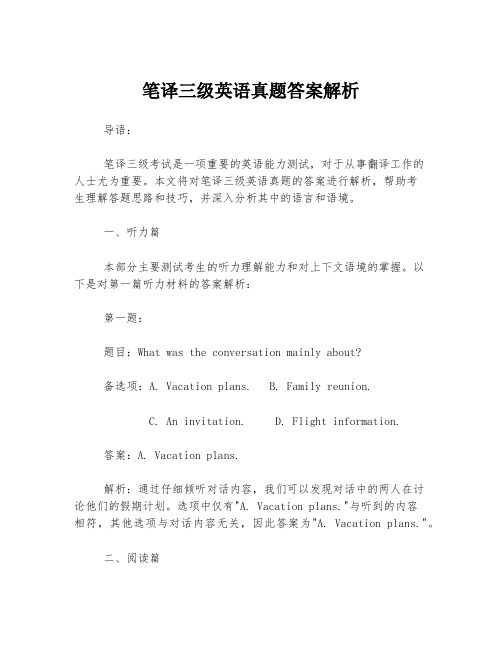
笔译三级英语真题答案解析导语:笔译三级考试是一项重要的英语能力测试,对于从事翻译工作的人士尤为重要。
本文将对笔译三级英语真题的答案进行解析,帮助考生理解答题思路和技巧,并深入分析其中的语言和语境。
一、听力篇本部分主要测试考生的听力理解能力和对上下文语境的掌握。
以下是对第一篇听力材料的答案解析:第一题:题目:What was the conversation mainly about?备选项:A. Vacation plans. B. Family reunion.C. An invitation.D. Flight information.答案:A. Vacation plans.解析:通过仔细倾听对话内容,我们可以发现对话中的两人在讨论他们的假期计划。
选项中仅有"A. Vacation plans."与听到的内容相符,其他选项与对话内容无关,因此答案为"A. Vacation plans."。
二、阅读篇阅读篇主要测试考生的阅读理解和阅读推理能力。
以下是对第二篇阅读材料的答案解析:第三题:题目:What can we infer from the passage?备选项:A. Smog is only a problem in big cities.B. Smog can cause respiratory problems.C. Air pollution only occurs in developing countries.D. Air pollution can be completely eliminated.答案:B. Smog can cause respiratory problems.解析:根据文章中提到的空气污染对健康的影响,特别是引起呼吸系统问题的描述,我们可以推断出答案为"B. Smog can cause respiratory problems."。
CATTI三级笔译实务全部试题真题及答案汇总
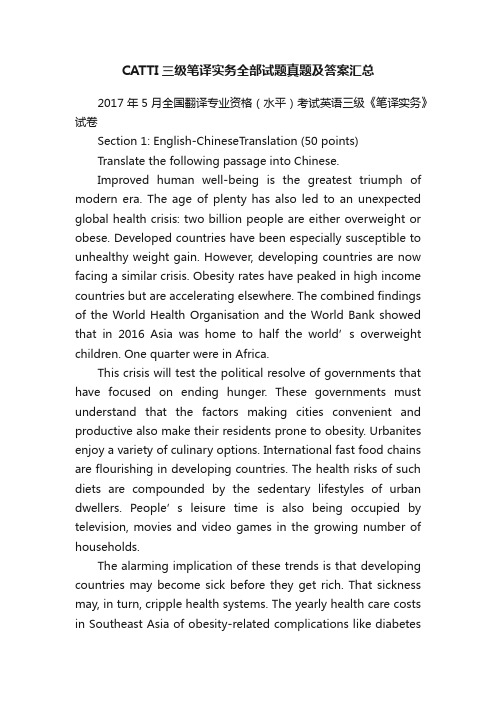
CATTI三级笔译实务全部试题真题及答案汇总2017年5月全国翻译专业资格(水平)考试英语三级《笔译实务》试卷Section 1: English-ChineseTranslation (50 points)Translate the following passage into Chinese.Improved human well-being is the greatest triumph of modern era. The age of plenty has also led to an unexpected global health crisis: two billion people are either overweight or obese. Developed countries have been especially susceptible to unhealthy weight gain. However, developing countries are now facing a similar crisis. Obesity rates have peaked in high income countries but are accelerating elsewhere. The combined findings of the World Health Organisation and the World Bank showed that in 2016 Asia was home to half the world’s overw eight children. One quarter were in Africa.This crisis will test the political resolve of governments that have focused on ending hunger. These governments must understand that the factors making cities convenient and productive also make their residents prone to obesity. Urbanites enjoy a variety of culinary options. International fast food chains are flourishing in developing countries. The health risks of such diets are compounded by the sedentary lifestyles of urban dwellers. People’s leisure time is a lso being occupied by television, movies and video games in the growing number of households.The alarming implication of these trends is that developing countries may become sick before they get rich. That sickness may, in turn, cripple health systems. The yearly health care costs in Southeast Asia of obesity-related complications like diabetesand cardiovascular disease are already as high as US $10 billion. Such diseases are an added burden on countries already struggling to manage primary health care needs.Policies related to taxation, urban design, education and the promotion of food systems may help control obesity at a lower cost than eventual medical treatment for an increasingly overweight population. Some governments have already experimented with direct interventions to control obesity, such as taxation on unhealthy foods and drinks. Thailand, Brunei, and Singapore have adopted soda tax . South Africa is likely to introduce a sugar tax beginning in April 2018. The city of Berkeley in California recognises that taxes alone are not enough to address obesity. Proceeds from the city’s sugar tax are used to support child nutrition and community health programmes. This underscores the importance of education.There is also promise in many initiatives. Urban design holds significant power to reshape lifestyle patterns and public health. Improving the attractiveness of public space can draw residents out of their cars and living rooms. A recent study of urban neighbourhoods in Shanghai and Hangzhou found that residents living in walkable neighbourhoods are healthier than residents living in less walkable neighourhoods in urban China. Finally, healthier lifestyles begin in grocery store aisles.Governments should encourage tighter connections between agricultural production systems, urban grocers and food vendors. Such initiatives can also help urban residents better understand the mechanics of food sourcing. This raises awareness about the relationship between natural foods and healthy lifestyles. Combining controls on unhealthy foods with policies that incentivise healthy eating and active lifestyles isimportant for developing countries from both an economic and social point of view. To quote the recent Global Nutrition Report, “Reducing obesity will boost global development.”Section 2: Chinese-EnglishTranslation (50 points)Translate the following passage into English.煤炭是地球上储量最丰富的能源,但目前反对使用煤炭的声浪日益高涨。
2017年11月笔译实务真题及答案

2017年下半年英语三级笔译实务试题It was just one word in one email, but it triggered huge financial losses for a multinational company.区区电子邮件里的一个单词,导致一家跨国公司遭受巨大经济损失。
The message, written in English, was sent by a native speaker to a colleague for whom English was a second language. Unsure of the word, the recipient found two contradictory meanings in his dictionary. He acted on the wrong one.这封电子邮件是由一位英语母语人士用英语所写,而邮件接收人则是一位以英语为第二语言的同事。
该同事收到邮件后,发现该单词在字典里有两个截然相反的意思,他拿捏不准,并最终选择了那个错误的意思。
Months later, senior management investigated why the project had flopped, costing hundreds of thousands of dollars. “It all traced back to this one word,”says Chia Suan Chong, a UK-based communications skills and intercultural trainer, who didn't reveal the tricky word because it is highly industry-specific and possibly identifiable.“Things spiralled out of control because both parties were thinking the opposite.”数月过去,该跨国公司的高管开始调查这个项目失败并损失几十万美元的原因。
2017下半年catti英语三级《笔译实务》科目真题
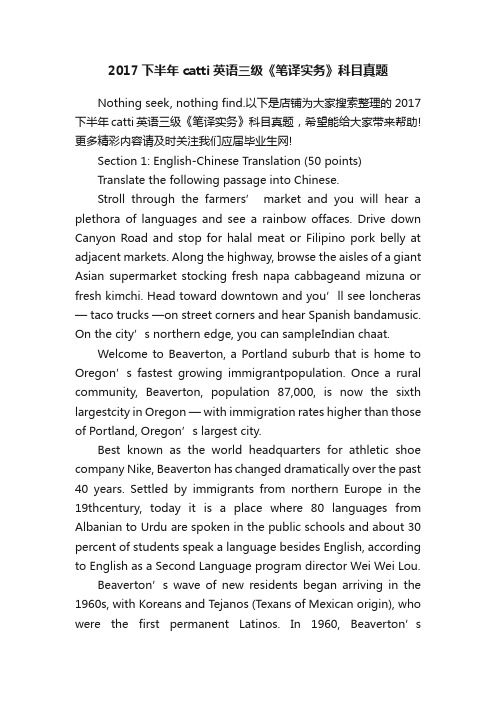
2017下半年catti英语三级《笔译实务》科目真题Nothing seek, nothing find.以下是店铺为大家搜索整理的2017下半年catti英语三级《笔译实务》科目真题,希望能给大家带来帮助!更多精彩内容请及时关注我们应届毕业生网!Section 1: English-Chinese Translation (50 points)Translate the following passage into Chinese.Stroll through the farmers’ market and you will hear a plethora of languages and see a rainbow offaces. Drive down Canyon Road and stop for halal meat or Filipino pork belly at adjacent markets. Along the highway, browse the aisles of a giant Asian supermarket stocking fresh napa cabbageand mizuna or fresh kimchi. Head toward downtown and you’ll see loncheras — taco trucks —on street corners and hear Spanish bandamusic. On the city’s northern edge, you can sampl eIndian chaat.Welcome to Beaverton, a Portland suburb that is home to Oregon’s fastest growing immigrantpopulation. Once a rural community, Beaverton, population 87,000, is now the sixth largestcity in Oregon — with immigration rates higher than those of Portland, Oregon’s largest city.Best known as the world headquarters for athletic shoe company Nike, Beaverton has changed dramatically over the past 40 years. Settled by immigrants from northern Europe in the 19thcentury, today it is a place where 80 languages from Albanian to Urdu are spoken in the public schools and about 30 percent of students speak a language besides English, according to English as a Second Language program director Wei Wei Lou.Beaverton’s wave of new residents began arriving in the 1960s, with Koreans and Tejanos (Texans of Mexican origin), who were the first permanent Latinos. In 1960, Beaverton’spopulation of Latinos and Asians was less than 0.3 percent. By 2000, Beaverton had proportionately more Asian and Hispanic residents than the Portland metro area. Today, Asians comprise 10 percent and Hispanics 11 percent of Beaverton’s population.Mayor Denny Doyle says that many in Beaverton view the immigrants who are rapidly reshaping Beaverton as a source of enrichment. “Citizens here especially in the arts and culture community think it’s fantastic that we have all these different possibilities here,” he says.Gloria Vargas, 50, a Salvadoran immigrant, owns a popular small restaurant, Gloria’s SecretCafé, in downtown Beaverton. “I love Beaverton,” she says. “I feel like I belong here.” Hermother moved her to Los Angeles as a teenager in 1973, and she moved Oregon in 1979. Shelanded a coveted vendor spot in the Beaverton Farmers Market in 1999. Now in addition to running her restaurant, she has one of the most popular stalls there, selling up to 200Salvadoran tamales — wrapped in banana leaves rather than corn husks —each Saturday. “Once they buy my food, they always come back for more,” she says.中国是一个发展中国家。
catti三级笔译历年试题整理2017-2019
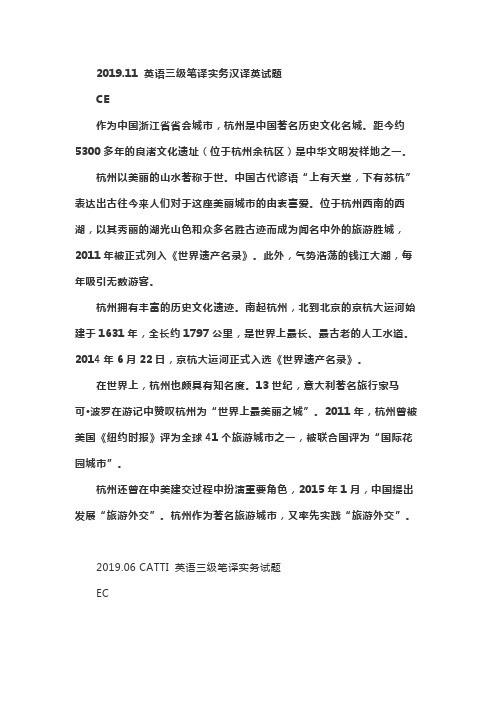
2019.11 英语三级笔译实务汉译英试题CE作为中国浙江省省会城市,杭州是中国著名历史文化名城。
距今约5300多年的良渚文化遗址(位于杭州余杭区)是中华文明发祥地之一。
杭州以美丽的山水著称于世。
中国古代谚语“上有天堂,下有苏杭”表达出古往今来人们对于这座美丽城市的由衷喜爱。
位于杭州西南的西湖,以其秀丽的湖光山色和众多名胜古迹而成为闻名中外的旅游胜城,2011年被正式列入《世界遗产名录》。
此外,气势浩荡的钱江大潮,每年吸引无数游客。
杭州拥有丰富的历史文化遗迹。
南起杭州,北到北京的京杭大运河始建于1631年,全长约1797公里,是世界上最长、最古老的人工水道。
2014年6月22日,京杭大运河正式入选《世界遗产名录》。
在世界上,杭州也颇具有知名度。
13世纪,意大利著名旅行家马可·波罗在游记中赞叹杭州为“世界上最美丽之城”。
2011年,杭州曾被美国《纽约时报》评为全球41个旅游城市之一,被联合国评为“国际花园城市”。
杭州还曾在中美建交过程中扮演重要角色,2015年1月,中国提出发展“旅游外交”。
杭州作为著名旅游城市,又率先实践“旅游外交”。
2019.06 CATTI 英语三级笔译实务试题ECBoth WHO’s constitution and the declaration assert that health is a human right, not a privilege for those who can afford it. Over time, that right has made its way into both national and international law. But importantly, the right to health is not simply a noble idea on a piece of paper. In the past 70 years, it has been a platform for major improvements in global health. Since 1948, life expectancy has increased by 25 years. Maternal and childhood mortality have plummeted. Smallpox has been eradicated and polio is on the brink. We have turned the tide on the HIV/AIDS epidemic.Deaths from malaria have dropped dramatically. New vaccines have made once-feared diseases easily preventable. And there are many other causes for celebration. But even as we continue to struggle with old threats, new ones have arisen. Climate change will have profound effects on health. Antimicrobial resistance has the potential to undo the gains of modern medicine.Vaccine hesitancy is putting millions of young lives at risk. Noncommunicable diseases, including heart disease, stroke, cancer diabetes, hypertension, lung diseases and mental illnesses have become the major killers of our time. And of course, we continue to face the ever-present threat of outbreaks and other health emergencies.In the past 12 months, WHO has responded to 47emergencies in 50 countries. As you know, we are currently responding to an outbreak of Ebola in the Democratic Republic of the Congo.As of today, there have been 373 cases and 216 deaths since the outbreak started in August. So far, we have managed to prevent Ebola from spreading across the border, partly because we have much better tools with which to fight Ebola than at any time in history. More than 32,000 people have been vaccinated, which is one of the reasons the outbreak has not spread further than it has.So far, 150 people have been treated with one of four drugs. 14 million travelers have been screened, there have been more than 190 safe and dignified burials, we have done door-to-door advocacy in almost 4000 households and we have trained more than 500 community leaders. But this outbreak has been much more difficult ton control, largely because of the security situation in eastern DRC. Armed groups operating in the area conduct regular attacks on the city of Beni, the epicentre of the outbreak. And every time there is an attack, the virus gets an advantage. Vaccination and contact tracing are disrupted.The best long-term investment in protecting and promoting the right to health is to invest in stronger health systems. Because there is simply no other way to achieve universal health coverageand the Sustainable Development Goals than primary health care, with a focus on health promotion and disease prevention. That’s why WHO and 10 other international health agencies have agreed to work together on a Global Action Plan for Healthy Lives and Well-Being.The plan has three strategic approaches:integration,acceleration and accountability.First, we have committed to align many of our processes to increase our collective efficiency. Second, we have committed to accelerate progress by identifying areas of work in which we can truly bend the curve and make more rapid progress towards the health-related SDGs –like research and development, data and sustainable financing. And third, we have committed to keep each other accountable, both to the people we serve, and to the donors and partners who expect results from the resources they give us.CE互联网在中国改革开放过程中起到的巨大作用怎么说都不为过。
2017年下半年CATTI英语三级笔译实务真题
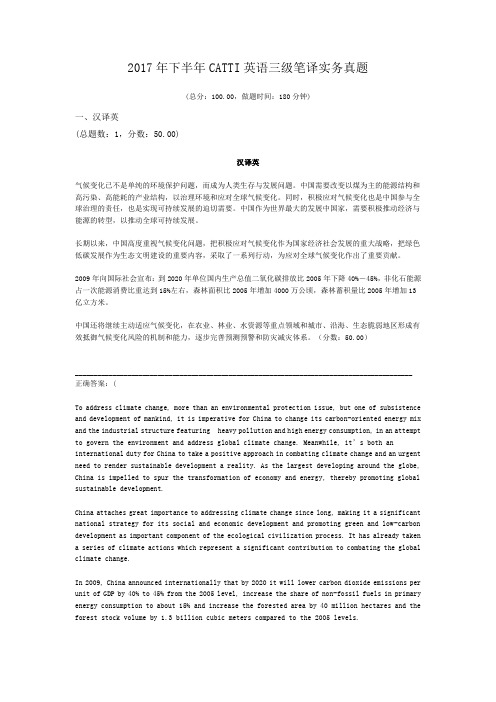
2017年下半年CATTI英语三级笔译实务真题(总分:100.00,做题时间:180分钟)一、汉译英(总题数:1,分数:50.00)汉译英气候变化已不是单纯的环境保护问题,而成为人类生存与发展问题。
中国需要改变以煤为主的能源结构和高污染、高能耗的产业结构,以治理环境和应对全球气候变化。
同时,积极应对气候变化也是中国参与全球治理的责任,也是实现可持续发展的迫切需要。
中国作为世界最大的发展中国家,需要积极推动经济与能源的转型,以推动全球可持续发展。
长期以来,中国高度重视气候变化问题,把积极应对气候变化作为国家经济社会发展的重大战略,把绿色低碳发展作为生态文明建设的重要内容,采取了一系列行动,为应对全球气候变化作出了重要贡献。
2009年向国际社会宣布:到2020年单位国内生产总值二氧化碳排放比2005年下降40%-45%,非化石能源占一次能源消费比重达到15%左右,森林面积比2005年增加4000万公顷,森林蓄积量比2005年增加13亿立方米。
中国还将继续主动适应气候变化,在农业、林业、水资源等重点领域和城市、沿海、生态脆弱地区形成有效抵御气候变化风险的机制和能力,逐步完善预测预警和防灾减灾体系。
(分数:50.00)__________________________________________________________________________________________ 正确答案:(To address climate change, more than an environmental protection issue, but one of subsistence and development of mankind, it is imperative for China to change its carbon-oriented energy mix and the industrial structure featuring heavy pollution and high energy consumption, in an attempt to govern the environment and address global climate change. Meanwhile, it’s both an international duty for China to take a positive approach in combating climate change and an urgent need to render sustainable development a reality. As the largest developing around the globe, China is impelled to spur the transformation of economy and energy, thereby promoting global sustainable development.China attaches great importance to addressing climate change since long, making it a significant national strategy for its social and economic development and promoting green and low-carbon development as important component of the ecological civilization process. It has already taken a series of climate actions which represent a significant contribution to combating the global climate change.In 2009, China announced internationally that by 2020 it will lower carbon dioxide emissions per unit of GDP by 40% to 45% from the 2005 level, increase the share of non-fossil fuels in primary energy consumption to about 15% and increase the forested area by 40 million hectares and the forest stock volume by 1.3 billion cubic meters compared to the 2005 levels.China will continue to proactively adapt to climate change by enhancing mechanisms and capacities to effectively defend against climate change risks in key areas such as agriculture, forestry and water resources, as well as in cities, coastal and ecologically vulnerable areas and to progressively strengthen early warning and emergency response systems and disaster prevention and reduction mechanisms.)解析:二、英译汉(总题数:1,分数:50.00)英译汉It was just one word in one email, but it triggered huge financial losses for a multinational company.The message, written in English, was sent by a native speaker to a colleague for whom English was a second language. Unsure of the word, the recipient found two contradictory meanings in his dictionary. He acted on the wrong one.Months later, senior management investigated why the project had flopped, costing hundreds of thousands of dollars. “It all traced back to this one word,” says Chia Suan Chong, a UK-based communications skills and intercultural trainer, who didn't reveal the tricky word because it is highly industry-specific and possibly identifiable. “Things spiralled out of control because both parties were thinking the opposite.”When such misunderstandings happen, it’s usually the native speakers who are to blame. Ironically, they are worse at delivering their message than people who speak English as a second or third language, according to Chong.A lot of native speakers are happy that English has become the world’s glo bal language. They feel they don’t have to spend time learning another language,” says Chong.The non-native speakers, it turns out, speak more purposefully and carefully, typical of someone speaking a second or third language. Anglophones, on the other hand, often talk too fast for others to follow, and use jokes, slang and references specific to their own culture, says Chong.“The native English speaker is the only one who might not feel the need to accommodate or adapt to the others,” she adds.With non-native English speakers in the majority worldwide, it’s Anglophones who may need to up their game.“Native speakers are at a disadvantage when you are in a lingua franca situation,” where English is being used as a common denominator, says Jennifer Jenkins, professor of global Englishes at the UK’s University of Southampton. “It’s the native English speakers that are having difficulty understanding and making themselves understood.”Non-native speakers generally use more limited vocabulary and simpler expressions, without flowery language or slang. And then there’s cultural style, Blattner says. When a Brit reacts to a proposal by saying, “That’s interesting” a fellow Brit might recog nise this as understatement for, “That’s rubbish.” But other nationalities would take the word “interesting” on face value, he says.“English speakers with no other language often have a lack of awareness of how to speak English internationally.”In Berlin, Coulter saw German staff of a Fortune 500 company being briefed from their Californian HQ via video link. Despite being competent in English, the Germans gleaned only the gist of what their American project leader said. So among themselves they came up with an agreed version, which might or might not have been what was intended by the California staff.“Too many non-Anglophones, especially the Asians and the French, are too concerned about not ‘losing face’ — and nod approvingly while not getting the mess age at all,” he says.That’s why Nerriere devised Globish —a distilled form of English, stripped down to 1,500 words and simple but standard grammar. “It’s not a language, it’s a tool,” he says. Since launching Globish in 2004 he’s sold more than 200,000 Globish text books in 18 languages.“If you can communicate efficiently with limited, simple language you save time, avoid misinterpretation and you don’t have errors in communication,” Nerriere says.When trying to communicate in English with a group of p eople with varying levels of fluency, it’s important to be receptive and adaptable, tuning your ears into a whole range of different ways of using English, Jenkins says.“People who’ve learned other languages are good at doing that, but native speakers of English generally are monolingual and not very good at tuning in to language variation,” she says.In meetings, Anglophones tend to speed along at what they consider a normal pace, and also rush to fill gaps in conversation, according to Steggles.He recommends making the same point in a couple of different ways and asking for some acknowledgement, reaction or action.(分数:50.00)__________________________________________________________________________________________ 正确答案:(邮件里的一个小小单词,却导致一家跨国公司蒙受了巨额经济损失。
- 1、下载文档前请自行甄别文档内容的完整性,平台不提供额外的编辑、内容补充、找答案等附加服务。
- 2、"仅部分预览"的文档,不可在线预览部分如存在完整性等问题,可反馈申请退款(可完整预览的文档不适用该条件!)。
- 3、如文档侵犯您的权益,请联系客服反馈,我们会尽快为您处理(人工客服工作时间:9:00-18:30)。
(1/1)SectionⅠEnglish Chinese Translation
Translate the following two passages into Chinese .
第1题
It was just one word in one email, but it triggered huge financial losses for a multinational company.
Non-native speakers generally use more limited vocabulary and simpler expressions, without flowery language or slang. And then there’s cultural style, Blattner says. When a Brit reacts to a proposal by saying, “That’s interesting” a fellow Brit might recognise this as understatement for, “That’s rubbish.” But other nationalities would take the word “interesting” on face value, he says.
“The native English speaker… is the only one who might not feel the need to accommodate or adapt to the others,” she adds.
With non-native English speakers in the majority worldwide, it’s Anglophones who may need to up their game.
“Native speakers are at a disadvantage when you are in a lingua franca situation,” where English is being used as a common denominator, says Jennifer Jenkins, professor of global Englishes at the UK’s University of Southampton. “It’s the native English speakers that are having difficulty understanding and making themselves understood.”
Months later, senior management investigated why the project had flopped, costing hundreds of thousands of dollars. “It all traced back to this one word,” says Chia Suan Chong, a UK-based communications skills and intercultural trainer, who didn’t reveal the tricky word because it is highly industry-specific and possibly identifiable. “Things spiralled out of control because both parties were thinking the opposite.”
When such misunderstandings happen, it’s usually the native speakers who are to blame. Ironically, they are worse at delivering their message than people who speak English as a second or third language, according to Chong.
The non-native speakers, it turns out, speak more purposefully and carefully, typical of someone speaking a second or third language. Anglophones, on the other hand, often talk too fast for others to follow, and use jokes, slang and references specific to their own culture, says Chong.
The message, written in English, was sent by a native speaker to a colleague for whom English was a second language. Unsure of the word, the recipient found two contradictory meanings in his dictionary. He acted on the wrong one.
“English speakers with no other language often have a lack of awareness of how to speak English internationally.”
A lot of native speakers arme the world’s global language. They feel they don’t have to spend time learning another language,” says Chong.
